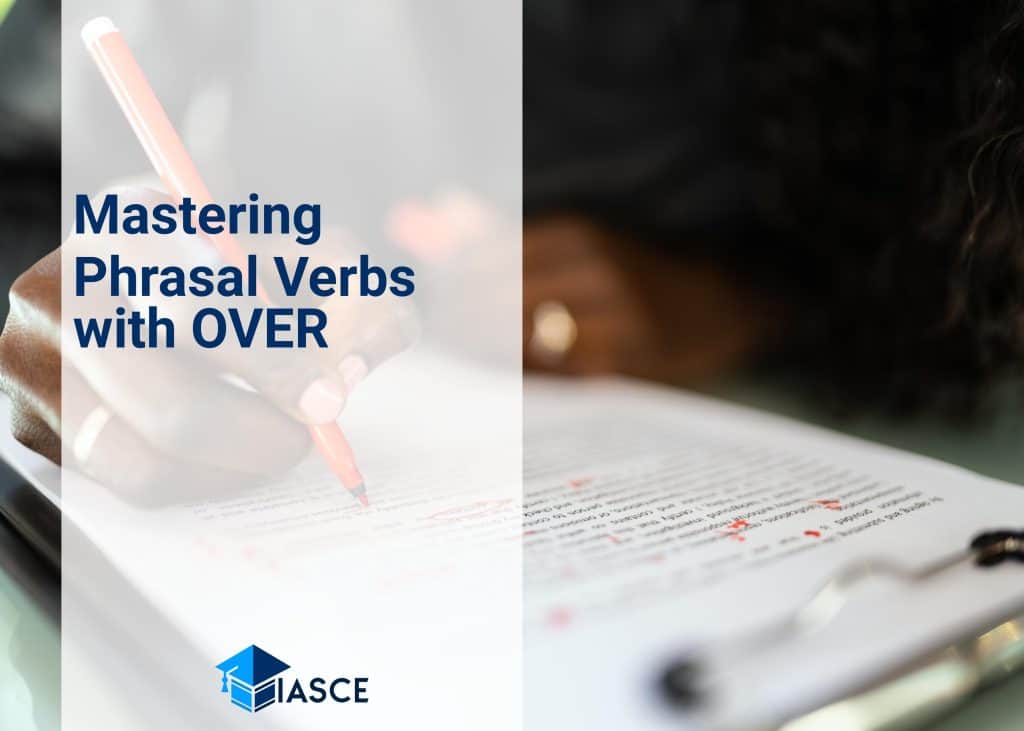Language is a fascinating beast, always evolving and growing. One of its most dynamic elements? Phrasal verbs. As an English language enthusiast, I’ve got a special place in my heart for these versatile linguistic tools. Today, I’m zeroing in on one specific set: phrasal verbs with “OVER”.
Why “over”, you might ask? Well, it’s more popular than you’d think, popping up in our everyday speech more often than we realize. From expressing the idea of examination as in ‘look over’ to demonstrating completeness like ‘overdo’, this little word carries significant weight! Along the way, I’ll be serving up some fresh grammar insights.
So buckle up and get ready to dive into the captivating world of phrasal verbs with OVER. Whether you’re a grammar guru or just starting out on your language journey, there’s something here for everyone!
Understanding Phrasal Verbs with ‘Over’
Now, let’s dive into the world of phrasal verbs – specifically those involving the word ‘over’. A phrasal verb, if you’re unsure, is a verb that’s paired with an adverb or preposition. The combination creates a meaning that’s often entirely different from the original verb.
Take for instance, “look over”. It doesn’t just mean to look in an upward direction. In fact, it usually means to review or inspect something carefully. Isn’t English fascinating? And sometimes perplexing?
There are countless other examples where “over” changes the whole game when paired with various verbs. I’ll share some of my favorites here:
-
Hand over: This doesn’t mean placing your hand above something else! Instead, it refers to giving something to someone else.
-
Go over: When used figuratively, this phrase implies reviewing or considering something in detail.
Let’s lay out some more examples in a practical table:
|
Phrasal Verb |
Example Sentence |
|---|---|
|
Take over |
She will take over as CEO next month. |
|
Think over |
I need to think over your proposal before making a decision. |
|
Run over |
I accidentally ran over my glasses this morning! |
Remember this: Context is key when interpreting these phrases. The same words can have drastically different meanings depending on their usage within a sentence.
Phrasal verbs may seem daunting at first with all their possible variations and interpretations but don’t worry! With practice and exposure, you’ll soon find them becoming second nature in your conversations and writings.
I hope these insights help illuminate how versatile and dynamic our language can be. Keep exploring English grammar with curiosity – there’s always more to discover!
Common Phrasal Verbs Using ‘Over’: Examples and Usage
I’m sure you’ve come across phrasal verbs with ‘over’ in your English learning journey. They’re everywhere in conversational English, and they can be quite tricky to master due to their varied meanings. Let’s delve into some of these commonly used phrasal verbs.
Hand over is often used when referring to giving something to someone else, typically in a formal or serious situation. For example: “The police officer demanded the driver hand over his license.”
Next on our list is go over, which generally means reviewing something. You might say, “Let’s go over the meeting agenda before we start.”
Another popular one is take over, meaning to assume control or responsibility of something. A sentence could read, “When the manager fell ill, her assistant had to take over her duties temporarily.”
There’s also think over, which refers to considering or pondering about something carefully. In a discussion, someone might interject with: “Give me some time to think it over before I make my final decision.”
Lastly, let’s look at get over, commonly used when talking about recovering from an illness or overcoming a problem. Like this: “It took me months to get over that flu.”
Here’s a summary:
|
Phrasal Verb |
Meaning |
Example |
|---|---|---|
|
Hand Over |
Give (something) formally or officially. |
The police officer demanded the driver hand over his license. |
|
Go Over |
Review something. |
Let’s go over the meeting agenda before we start. |
|
Take Over |
Assume control/responsibility. |
When the manager fell ill, her assistant had to take over her duties temporarily. |
|
Think Over |
Consider carefully. |
Give me some time to think it over before I make my final decision. |
|
Get Over |
Recover from/overcome a problem. |
It took me months to get over that flu. |
Remember that context plays a significant role in understanding these phrases’ exact meaning as they can differ based on how they’re used! So keep practicing and immerse yourself in various contexts where these phrasal verbs are applied – it’ll help you gain confidence and proficiency in using them effectively!
Conclusion: Mastering Phrasal Verbs with ‘Over’
Let’s wrap up our journey exploring phrasal verbs with ‘over’. By now, you should have a solid understanding of this intriguing aspect of English grammar. We’ve delved into several examples that illustrate how these phrases work in various contexts.
Phrasal verbs can be daunting, but they don’t have to be. They are just like any other part of the language – it’s all about practice and application. The more you use them in your daily communication, the easier they’ll become to understand and use correctly.
Now remember the key points we’ve covered:
-
Phrasal verbs with ‘over’ often describe an action that is thorough or complete.
-
Understanding the context is crucial for using these phrases correctly.
-
Practice makes perfect when learning to master phrasal verbs.
So don’t feel overwhelmed by phrasal verbs with ‘over’. Start incorporating them into your conversations and written communications today. You’ll soon find that they add richness and variety to your English skills.
In summary, mastering phrasal verbs – especially those tricky ones with ‘over’ – significantly enhances your command over English. So keep practicing, stay curious, and continue expanding your linguistic horizons!

